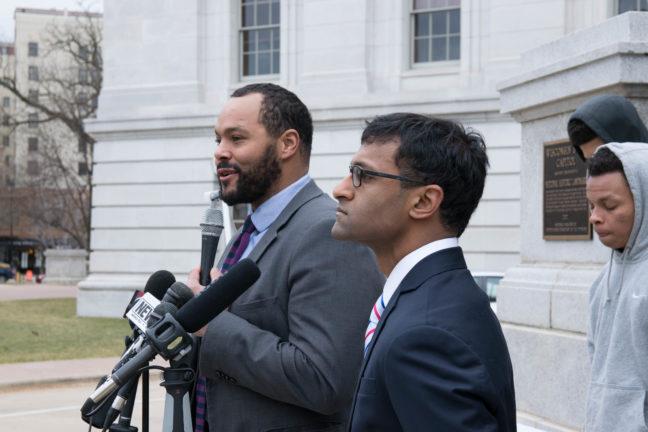Lawyers who represented the family of Tony Robinson in a recently settled federal civil rights lawsuit gave a detailed news conference on the events surrounding the 19-year-old’s death, which occurred exactly two years ago.
Anand Swaminathan, one of the two presenting lawyers, said the conference’s objective was to provide the transparency needed to enact reform within the Madison Police Department. The presentation covered inconsistencies between forensic evidence and testimony given by the officer responsible for shooting Robinson.
Swaminathan along with lawyer David Owens presented the audio, visual and ballistic evidence he used to secure the $3.35 million settlement with the city of Madison in February. He said the evidence conflicts with the narrative Kenny provided in four ways.
Tony Robinson’s family reaches record $3.35 million settlement for fatal shooting
Specifically, Swaminathan said evidence disputed the location of the first three shots fired, Robinson’s proximity when the first three shots were fired, Kenny’s account for three shots fired from a distance and the necessity of the last three shots fired during the incident.
“There are two stories about what happened in that stairwell and this is not a ‘he-said she-said,’” Swaminathan said. “This is a ‘he-said she’s dead,’ so there’s no one to tell the other side of the story.”
Officer who shot Tony Robinson to remain with MPD, won’t return to patrol duties
In providing the details, which are published online, Swaminathan said he hoped to let “Tony be Tony” in the wake of the the unflattering narratives presented in the wake of the shooting.
Using the same forensic evidence, Swaminathan presented an alternate timeline of events that puts Kenny at a greater distance from Robinson with room to retreat when the first three shots were fired. The alternative story also presents the last three shots fired by Kenny as being unnecessary and ultimately killing Robinson.
Despite historically large settlement, family still ‘feels void’ from Tony Robinson’s death
Swaminathan said Madison is a special city because of its engaged community and elected officials who are likely to listen to their constituents’ desires. He also commended the general professionalism of MPD in most aspects of its operation.
But Swaminathan said MPD suffers from the same critical problem seen in police departments across the country: the almost defensiveness that immediately follows an officer involved shooting. He pointed to emails sent by the internal investigations lead officer 12 hours after the incident in which he expressed a desire to avoid interviewing Kenny.
“There is one way in which [MPD] is like all the worst police departments and that is that they reflexively defend the officer in officer-involved shootings,” Swaminathan said.
MPD did not immediately respond for comment.












